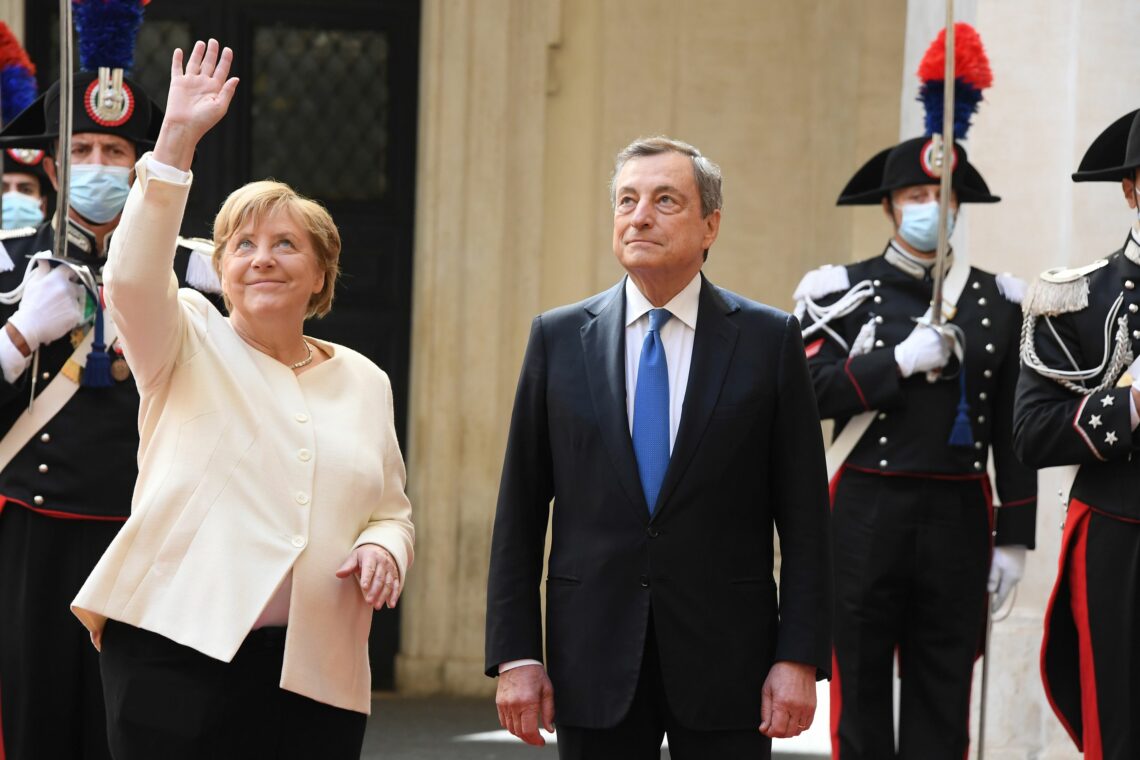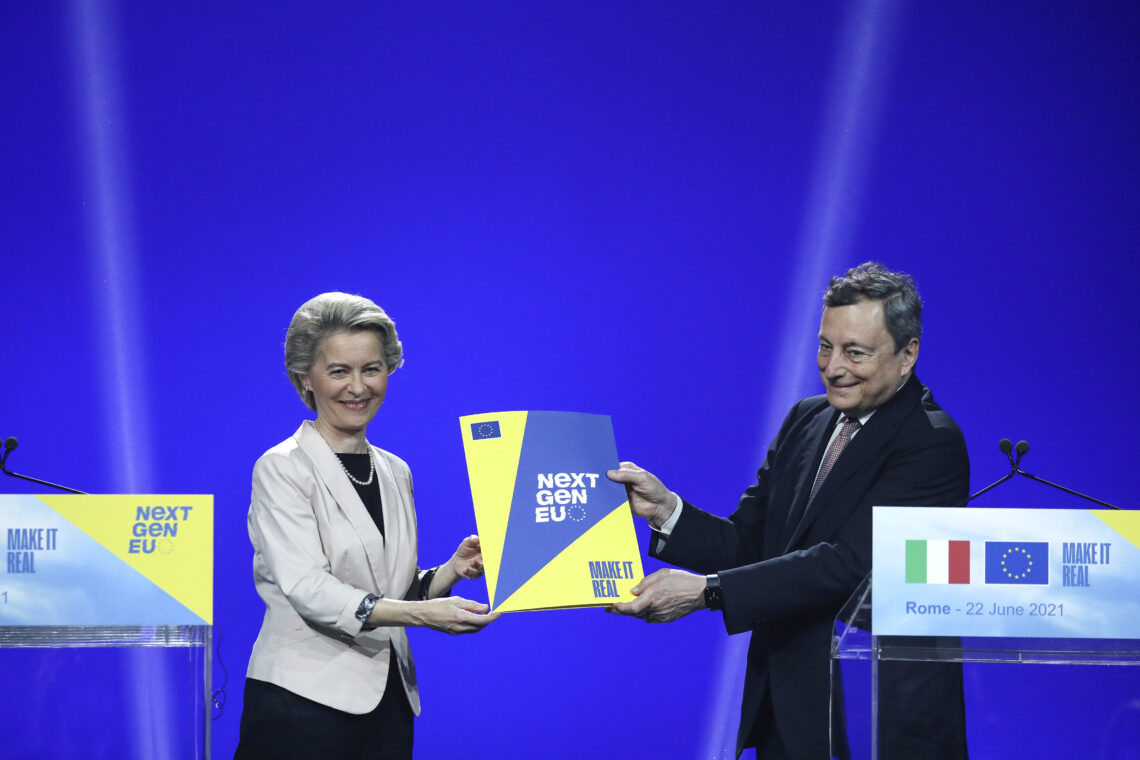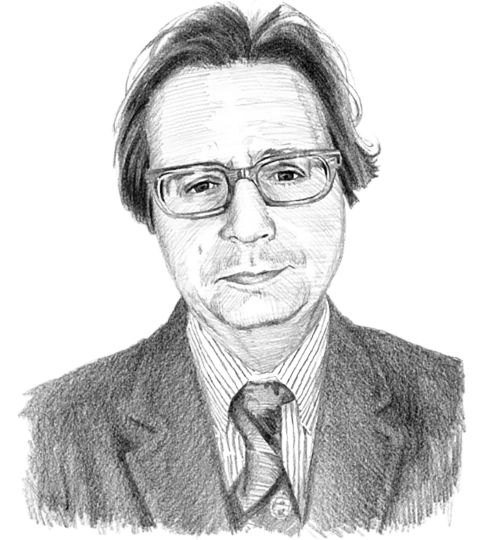Mario Draghi’s rising profile in Europe
As German Chancellor Angela Merkel exits the stage, some in Europe are hoping for the rise of former ECB President Mario Draghi. But Italy’s fickle politics can be lethal for even the most prestigious careers.

In a nutshell
- Mario Draghi is well-positioned to become the ‘leader’ of Europe
- So far, he has achieved his goals to put Italy back on track
- Fickle Italian politics could make his star fade quickly
European leadership is in a moment of profound change. Angela Merkel, so long the unquestioned face of European decision-making, is leaving her position as German chancellor. French President Emmanuel Macron, her close ally since he entered office in 2017, has a tough slog to win a second term in the 2022 election. Pedro Sanchez, Spain’s socialist prime minister, never gained significant standing beyond his own country.
Of Europe’s biggest, most influential countries, that leaves Italy. Its current prime minister, Mario Draghi, has clout and name recognition, meaning he could emerge as the successor to Ms. Merkel as the pivot point for European politics. In this regard, Prime Minister Draghi has a strength that neither President Macron nor Chancellor Merkel ever possessed: he is a former president of the European Central Bank, where his tenure was marked by his controversial yet unforgettable promise to do “whatever it takes” to save the euro.
Mr. Draghi’s greatest strength is also his weakness. As opposed to Chancellor Merkel and President Macron, his premiership is not the result of national elections. He came to power after the disintegration of the government led by his predecessor, Giuseppe Conte, as a result of Italian political parties’ attempt to come to a truce over how to spend European Union Covid-19 recovery funds. Except for Giorgia Meloni’s Brothers of Italy party, they all came together to support the politician with the most impressive resume of his generation.
Steady hand
That such a broad coalition underpins Mr. Draghi’s position drastically limits his room for maneuver. Instead of getting bogged down in the negotiations over every issue, the prime minister has preferred a division of labor, where he concentrates on his priorities and lets the parties in the coalition quarrel over anything else.
Prime Minister Draghi’s proposed changes offer a blank slate to future governments.
So far, Mr. Draghi has focused on two goals. The first is bringing the pandemic under control. To achieve this, he has now extended requirements for a vaccine passport to many aspects of Italian life. Employees can enter their workplaces only upon showing their “green pass,” which certifies that they have been vaccinated, received a negative test in the previous 48 hours or are immune.
Italy borrowed the idea from President Macron’s France, where the passe sanitaire was used to nudge the vaccination process forward. Italy had a more successful vaccination campaign even before the introduction of the green pass, but nevertheless chose to implement it widely. One reason for this is that Italian regulators considered Covid-19 infection a workplace accident. Businesses then enthusiastically supported vaccination requirements that would shield them from legal and insurance liability.
Prime Minister Draghi’s second goal was putting together a schedule for fiscal reforms that would please Brussels and keep the Covid-19 relief funds flowing. So far, the changes he is pushing offer a blank slate to future governments. They could allow anything from a flat income tax (a popular idea on the right) to a progressive income tax with seven brackets, like in Germany (favored by some on the left). However, as long as Italy meets the milestones, Brussels will keep the tap open. Having a known factor like Prime Minister Draghi at the helm helps instill credibility with EU leaders.
Unless infections rocket, observers will consider the Draghi government successful on both counts – and in achieving its goals, it has so far suffered only minor resistance from within its own ranks. Opposition to the green pass came from a group that is not yet formally organized politically and which was not backed by the right-wing Lega, despite some of that party’s parliamentarians sympathizing with the group. The coalition parties have swallowed the prime minister’s reforms, though Mr. Draghi has been sure not to administer pills that are too bitter.

In many ways, the prime minister can say he has accomplished the mission he was given upon his appointment. The Italian media overwhelmingly support him. His reputation and approval ratings are high, even though (or perhaps because) he never gives television interviews and seems to have no interest in speaking directly with the public.
Contested future
It is in this context that Mr. Draghi’s future is becoming an issue, for Italian and European politics alike. The most obvious next step would be for him to run for president in early 2022. He would probably win, and on paper at least, it would be an outcome a wide swathe of Italian politicians would favor. Lega’s Matteo Salvini and the Brothers of Italy’s Giorgia Meloni would likely find it a positive development. As head of state, Mr. Draghi could be a superminister for foreign affairs, using his own credibility to shield Italian politics from European partners’ criticisms for the seven years he would be in office.
Polls show that together, the parties led by Mr. Salvini and Ms. Meloni will win a majority of the vote in the next general elections. However, their right-wing credentials raise eyebrows throughout European capitals. As president, Mr. Draghi could reassure the continent’s leaders that he is dutifully keeping these two in line.
The left has different plans. Democratic Party leader Enrico Letta gained political capital from recent local elections in which the left won in most of Italy’s big municipalities. Though the polls do not show any sign of his party gaining significantly at the national level, governing Milan, Rome, Naples, Bologna and Turin has its advantages, and the victories have galvanized the left’s expectations for the near future.
Mr. Letta needs Mr. Draghi as president far less than his competitors on the right do.
As opposed to Mr. Salvini and Ms. Meloni, Mr. Letta is not unwelcome in Brussels. In fact, he has been a well-respected member of the European establishment for years. The left-wing politician needs Mr. Draghi as president of the Republic far less than his competitors on the right do. And in contrast to them, he has several serious contenders for the same position within the ranks of his party, beginning with former prime minister and European Commission president, Romano Prodi.
People close to the Democratic Party have been openly flirting with the idea of keeping Mr. Draghi as prime minister until 2023 (by which time Italy will have to hold new elections), or even longer, as the prime minister’s mandate can be extended. They do not seem to consider it a problem that Mr. Draghi is 74 years old. Many Italian policymakers believe that a perennial grand coalition may be the only way to offer the country some political stability. They also think that with Mr. Draghi at the helm, Italy could make EU fund transfers permanent, rather than a one-off byproduct of the pandemic. This explains Italians’ enthusiasm for Olaf Scholz becoming chancellor – they believe that a German government led by a Social Democrat will be keener to make Europe a transfer union.
Fallen European
It was reported that in their last meeting in Rome, Chancellor Merkel told Prime Minister Draghi that she wished he would stay on as a prime minister and play her role in Europe. But Ms. Merkel had much more political stability and full control over her party in her 16 years as chancellor. Mr. Draghi is an independent and knows that the longer he stays on, the more problems he will have keeping Italy’s political parties on a leash.
The longer Mr. Draghi stays in office the more of a partisan figure he will become.
For him, the presidency will be a congenial conclusion to a stellar career. His deft management of the G20 meeting in Rome showed how well he takes to ceremonial offices. However, that would not allow him to exercise an executive role at the European level and many people think that the EU needs a stronger and more credible leader.
So, Mr. Draghi may be held from higher office both by the Democratic Party, which wants the post for itself, and by foreign pressure. Nevertheless, politicians in other EU countries should remember that Italy recently had another prime minister who was much admired in the EU, but whose prestige rapidly eroded at home: former EU Commissioner Mario Monti.
While it is unlikely that Prime Minister Draghi will follow Mr. Monti’s route – founding his own party and running in elections – the longer he stays in office the more of a partisan figure he will become. The results for Italy could be disastrous, while offering Europe no benefit.
Italy has a reputation for periodically searching for a savior and then tearing the candidates for that role into pieces. Could the country’s reputation ever recover if that fate befalls the man who “saved” the euro?








